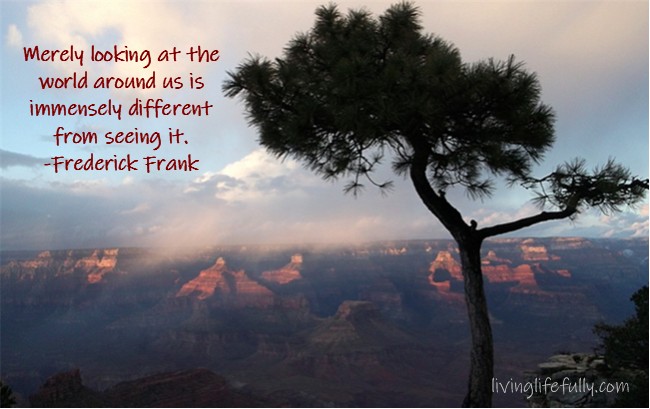|
Today's
Quotation:
The world
is too much with us; late and soon,
Getting and spending, we lay waste our powers:
Little we see in Nature that is ours;
We have given our hearts away, a sordid boon!
The Sea that bares her bosom to the moon;
The winds that will be howling at all hours,
And are up-gathered now like sleeping flowers;
For this, for everything, we are out of tune.
William Wordsworth
|
|
Today's
Meditation:
I'm
planning on writing a book on the concept of laying waste
our powers. Wordsworth's image here is one that I
think of every day: "Getting and spending, we lay
waste our powers": what that says to me is that we have
this incredible amount of power in ourselves, yet we use it
on trivialities. It's like we take a huge tractor that
can tow 200 tons, and we hook it up to tow a 50-pound rock
to a place fifty miles away. If the trip takes five
hours, imagine how much potential power is being wasted by
using such a powerful tractor for such a banal task.
Every
day, our bodies and minds create an amazing amount of power
and potential. What do we tend to do with that
energy? Well, there's television for one--many people
spend four or five hours a day in front of the screen, and all
their potential is soaked up by the couch or the
armchair. Shopping is important when we need to
fulfill needs, but if our major focus in life is in making
money just to spend it, then we're definitely laying waste
our powers. If we allow ourselves to bow out of the
rat race, if we have fewer or simpler needs, then we won't
need to spend as much, which means that we won't have to
work as much, which means that we'll have more time and
power for other things that matter so much more, like
developing our spirits and our knowledge of who we are and
why we're here and spreading kindness and practicing
compassion.
Wordsworth
claims that by using up our powers on getting and spending,
we've lost our connection to nature, a force that can do us
much more good than we can imagine, if only we let it.
We've given our hearts away and we've lost touch with the
important things in life, great gifts that we leave alone to
gather dust in the closet. We don't go for the walks
in the woods on a regular basis, and we don't spend time
with the natural things of the world.
What's
worse, though, is that we don't seem to learn--he wrote this
poem circa 1802. I wonder when we'll finally take works
like this to heart and learn from them. . . .
|
